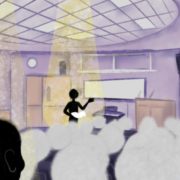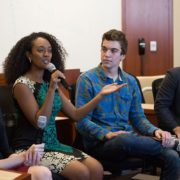We shouldn’t despair. Just like the Neanderthals, something of us will be left in those intelligent digital beings that come to replace us.
When Geoffrey Hinton, 75, announced his resignation from Google, he noted regret for his work and commented that some of the dangers associated with AI chatbots were “quite scary.” He then forewarned that although, at present, AI chatbots do not equal human intelligence, they likely will soon. Another computer scientist, Professor Yoshua Bengio, told the BBC that he felt “lost” over his life’s work related to AI and was concerned about the direction and speed at which AI was developing. And just the other day, a Yale professor conducted a survey in which 42% of CEOs who participated indicated they believe AI could destroy humanity within ten years.
Hinton, a cognitive psychologist and computer scientist, argued that GPT-4 already surpasses the amount of general knowledge an individual has by far, and, soon enough, it will do the same with reasoning.
He also made an interesting point: that, as biological systems, the way humans are intelligent is quite different from the digital systems we have created. Each digital system has the same world model; therefore, while they can learn individually, they share knowledge instantly. That’s what makes chatbots so powerful.
Hinton’s thoughts reminded me of a talk I attended at Yale back in the 1980s in which a prominent AI and robotics researcher, Hans Moravec, commented that he saw computer science as generating the next direction in evolution, an idea he elaborated on in Mind Children: The Future of Robot and Human Intelligence. For Moravec, the emergence of intelligent machines and their eventual replacement of humanity was just another chapter in the ongoing process of evolution on our planet.
Hinton isn’t the only one scared. There is plenty of conversation on social media about the problems with ChatGPT and fears about the possibility of AI taking over the world and eventually replacing humanity as the dominant intelligence on this planet. It’s worth asking: Should we really be concerned about this?
The natural response is, “Of course, we should, you idiot. Humanity is special, and we must protect ourselves and our species!” I’m not so sure. For one thing, the idea that humanity is special is a decidedly Abrahamic perspective. Other worldviews, such as the Buddhist one, place far less emphasis on the belief that humans are particularly special or important. There is no creator god in Buddhism who passes its image on to its creation. So, on the one hand, there is an ethnocentric element to this idea that should be kept in mind.
The Abrahamic worldview, in fact, is a major part of the problem because it sets up a sense in which there is a sharp contrast between humans and nature. Humans, and their creations, are not part of the natural world—they are something different. In his book The Coevolution: The Entwined Future of Humans and Machines, computer scientist Edward Ashford Lee makes a strong case that this way of seeing the world is misguided.
Lee notes that we are products of natural processes like evolution and, therefore, so are our machines. In fact, he argues that not only are those machines the product of evolution, but they’re also alive.
This may sound odd, but it makes sense if you think a bit. I doubt most people reading this would argue that a beaver den or a bird’s nest is not part of nature. But both of those are technological innovations made by the animals that built them. And innovation continues. Not too long ago, I found a bird’s nest in my backyard with a plastic sheet on the floor. I see that as some rather intelligent creativity.
Why is what a bird or a beaver builds natural, but what humans build artificial? It really doesn’t make sense. Of course, we build a lot more complex things than other animals, but we are still animals that build things—and those things, including chatbots, are part of the natural world.
Thus, one can argue chatbots are simply another new form of life that is emerging through the ongoing process of change that we call evolution.
It’s different from other new life forms because it’s a product of an intelligent being that has created it. But it’s still part of the overall evolution process we see constantly unfolding on our planet.
Now, here’s the hard part for humans. Moravec is probably right. Those products of our natural inventiveness will most likely surpass our abilities soon and may even displace us. It may well be that we are the Neanderthals of our age. Neanderthals are believed to have emerged in Europe as early as 400,000 years ago and probably went extinct about 40,000 years ago, several thousand years after Homo sapiens arrived. Over a long period of time, our ancestors and Neanderthals intermingled, interbred, and eventually, modern humans came to become the dominant species while Neanderthals disappeared, leaving behind traces of themselves in our DNA.
It may well be that we are today experiencing the beginning of another major transition from one intelligent species to a new one. Modern humans have had a good run but have also defiled their planet and spent much time killing each other (and pretty much everything else within sight). Perhaps our time is ending, just like the Neanderthals, as a very different and more capable form of intelligent life emerges.
Besides being a major blow to that vast human ego, I see no reason to view this as bad. The mess we’ve made of our planet is obvious, so perhaps it’s time for a new being—a new form of intelligence—to give it a go.
Or perhaps we will find ways to merge with our technology, and the next phase in evolution is the emergence of a cyborg race. In the long run, it doesn’t matter because evolution continues, and this version of humanity is inevitably doomed because the environment in which we live is constantly changing. For humans, that change is often the result of our own activity. Maybe the time for our demise is now.
The fact that this new intelligence isn’t biological does not make it any less a product of nature and a product of evolution than humans. It emerged in a new way, a product of evolutionary change over a long time. Culture is a result of evolution, and culture is the tool through which we evolved the ability to create things like intelligent digital systems. It is entirely natural that the innovations of cultural activity will lead to the emergence of new species.
But we shouldn’t despair. Just like the Neanderthals, something of us will be left in those intelligent digital beings that come to replace us. That which is the essence of human existence and creativity won’t disappear. It will just become part of something new.
_________
Cover graphic courtesy of The Economic Times



